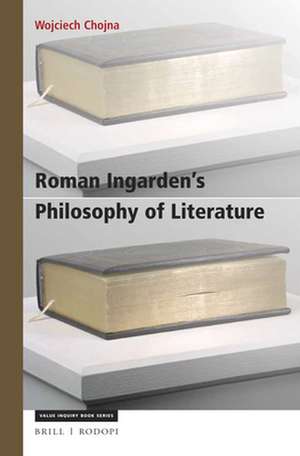Roman Ingarden’s Philosophy of Literature: A Phenomenological Account: Value Inquiry Book Series / Philosophy, Literature, and Politics, cartea 313
Autor Wojciech Chojnaen Limba Engleză Paperback – 15 noi 2017
Literature offers us diverse experiences changing our perceptions of ourselves and the worlds we live in. Absolutism proclaiming unmitigated access to the meaning of literary texts is intolerant of differences and leads to violence in life. Conversely, relativism, in the illusory spirit of radical tolerance, turns meanings and values into historically contingent, incompatible interpretations, where communication and reconciliation is impossible, thus justifying ideological conflicts and violence.
Preț: 330.36 lei
Nou
Puncte Express: 496
Preț estimativ în valută:
63.21€ • 66.18$ • 52.31£
63.21€ • 66.18$ • 52.31£
Carte indisponibilă temporar
Doresc să fiu notificat când acest titlu va fi disponibil:
Se trimite...
Preluare comenzi: 021 569.72.76
Specificații
ISBN-13: 9789004357129
ISBN-10: 9004357122
Pagini: 182
Dimensiuni: 155 x 235 mm
Greutate: 0 kg
Editura: Brill
Colecția Brill
Seria Value Inquiry Book Series / Philosophy, Literature, and Politics
ISBN-10: 9004357122
Pagini: 182
Dimensiuni: 155 x 235 mm
Greutate: 0 kg
Editura: Brill
Colecția Brill
Seria Value Inquiry Book Series / Philosophy, Literature, and Politics
Cuprins
Preface
Introduction
Ingarden’s Relevance Today
1 Introduction to the Concept of Identity
Some Traditional Approaches
Ingarden’s General Ontology
2 Nature and Identity of a Literary Work in American Aesthetics
Nelson Goodman’s Syntactical Identity
Richard Wolheim’s Amendment
Psychologism
Semantic Accounts
Joseph Margolis’s Culturally Emergent Objects
3 Phenomenological Concept of Identity
Identity of a Perceptual Object
The Concept of Intentionality
The Concept of Constitution
Ideality and Identity of the Objectivities of Understanding
Husserl’s Theory of Meaning
Ingarden’s Objections to Husserl’s Transcendental Idealism
Hermeneutic Challenges against the Possibility of Transcendental Phenomenology
4 Literary Work as a Schematic Structure
The Notion of a ‘Purely Intentional Object’
Schematism
Structure of a Literary Work of Art
The Stratum of Linguistic Sound Formations
The Stratum of Meanings
Meanings of Sentences
The Stratum of Presented Objects
The Stratum of Schematized Aspects
Objections to Ingarden’s Conception of the Four Strata of Literary Work
The Order of Sequence of Parts
Quasi-judgments
5 Aesthetic Experience and Life of a Literary Work of Art
Aesthetic Experience
Problems Pertaining to Aesthetic Experience
Pre-aesthetic Cognition of a Literary Work of Art
Cognition of an Aesthetic Object
The Work and Its Concretizations
‘Life’ of a Literary Work of Art
6 Values of Literary Work of Art
Artistic and Aesthetic Values
The Stratum of Sounds and Its Function in the Constitution of Aesthetic Qualities
The Stratum of Meanings and Its Function in the Constitution of Aesthetic Qualities
De Gustibus Non Est Disputandum
Metaphysical Qualities
Poetry as a Means of Cognition
7 The Identity of a Literary Work of Art
Identity of Sounds
Identity of Meanings
Dialectics of Identity
Subjectivism, Relativism and Identity
Epilogue
Bibliography
Index
Introduction
Ingarden’s Relevance Today
1 Introduction to the Concept of Identity
Some Traditional Approaches
Ingarden’s General Ontology
2 Nature and Identity of a Literary Work in American Aesthetics
Nelson Goodman’s Syntactical Identity
Richard Wolheim’s Amendment
Psychologism
Semantic Accounts
Joseph Margolis’s Culturally Emergent Objects
3 Phenomenological Concept of Identity
Identity of a Perceptual Object
The Concept of Intentionality
The Concept of Constitution
Ideality and Identity of the Objectivities of Understanding
Husserl’s Theory of Meaning
Ingarden’s Objections to Husserl’s Transcendental Idealism
Hermeneutic Challenges against the Possibility of Transcendental Phenomenology
4 Literary Work as a Schematic Structure
The Notion of a ‘Purely Intentional Object’
Schematism
Structure of a Literary Work of Art
The Stratum of Linguistic Sound Formations
The Stratum of Meanings
Meanings of Sentences
The Stratum of Presented Objects
The Stratum of Schematized Aspects
Objections to Ingarden’s Conception of the Four Strata of Literary Work
The Order of Sequence of Parts
Quasi-judgments
5 Aesthetic Experience and Life of a Literary Work of Art
Aesthetic Experience
Problems Pertaining to Aesthetic Experience
Pre-aesthetic Cognition of a Literary Work of Art
Cognition of an Aesthetic Object
The Work and Its Concretizations
‘Life’ of a Literary Work of Art
6 Values of Literary Work of Art
Artistic and Aesthetic Values
The Stratum of Sounds and Its Function in the Constitution of Aesthetic Qualities
The Stratum of Meanings and Its Function in the Constitution of Aesthetic Qualities
De Gustibus Non Est Disputandum
Metaphysical Qualities
Poetry as a Means of Cognition
7 The Identity of a Literary Work of Art
Identity of Sounds
Identity of Meanings
Dialectics of Identity
Subjectivism, Relativism and Identity
Epilogue
Bibliography
Index
Notă biografică
Wojciech Chojna, Ph.D. (1992), Temple University, Professor, Pasco-Hernando State College, USA; published articles and translations on aesthetics and philosophy, including “Phenomenological Redescription of Violence” in Justice, Law and Violence (Temple University Press, 1991), “Philosophy and the Modern World” in the Kwartalnik Filozoficzny (2006, translation).













